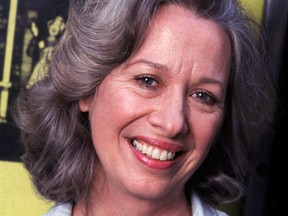Polly Holliday, a brassy waitress on TV’s ‘Alice,’ dies at 88

Article content
Polly Holliday, a character actress who attracted a national following as the brassy Southern waitress Flo on the 1970s sitcom “Alice,” dispatching rude diner customers and her cheapskate boss with the country-fried put-down “Kiss mah grits!,” died Sept. 9 at her home in Manhattan. She was 88.
Her death was confirmed by her friend and manager Dennis Aspland, who did not cite a cause.
Aside from her Dixie roots, the Alabama-born Ms. Holliday had little in common with the hip-swinging, gum-snapping, bleached beehive-sporting, man-crazy Flo. She was, by nearly all accounts, contemplative and erudite, with a gentle lilt in her voice when she was not throwing off sarcastic barbs in character. Once an aspiring concert pianist, she pursued a master’s degree in music education and taught public school for years before embarking on an acting career.
Ms. Holliday spent more than a decade performing in repertory theatres along the East Coast before her 1974 Broadway debut in Murray Schisgal’s Manhattan-set farce “All Over Town,” in which she played a Southern matron.
The show’s director was Hollywood star Dustin Hoffman, who later played Washington Post journalist Carl Bernstein in the Watergate film “All the President’s Men” (1976). He recommended Ms. Holliday for a brief but memorable role as a hostile receptionist who tries to impede Bernstein’s reporting.
The film’s casting director also worked on “Alice” and invited Ms. Holliday to audition for the role of Florence Jean Castleberry.
“She’s not like me, and I feel I know her,” Ms. Holliday told syndicated journalist Fred Robbins in 1980. “My father was a truck driver for a lumber company. Often I’d go with him on trips, and, stopping at diners and truck stops, I met a lot of women like Flo. They’d usually had a pretty tough life and, as a result, had learned to protect themselves with a sense of humour that could stop people in their tracks – laughing.”
After spending years trying to disguise her Southern accent for theatre roles in works by Shakespeare, Chekhov and Molière, Ms. Holliday played it up as Flo. Her blend of screechy twang and taffy-like drawl – she addressed Mel, the diner owner, as “May-ul” – sent one producer tumbling off his chair in a fit of laughter.
Ms. Holliday said she initially turned down the role, fearing that “if the show wasn’t successful, where would I be with a head of bleached hair?”
RECOMMENDED VIDEO
She prevailed on producers to let her use a wig. And her less-than-buxom frame, she told the Minneapolis Star-Tribune, required further adjustments: “It turned out I had to wear a lot more than wigs to build me out, a whole superstructure, but that’s another story.”
“Alice,” which began airing on CBS in 1976, was based on the 1974 comedy-drama “Alice Doesn’t Live Here Anymore,” starring Ellen Burstyn in an Oscar-winning performance as a widowed mother and aspiring singer who takes a waitressing job at an Arizona greasy spoon. Diane Ladd received an Oscar nomination for her supporting role as the thick-skinned, obscenity-spouting and deeply sympathetic Flo.
The sitcom, with only a superficial connection to the film, had Linda Lavin in the title role and featured Vic Tayback as Mel, Beth Howland as the clumsy, scatterbrained waitress Vera, and Ms. Holliday as the sassy old hand from Cowtown, Texas, who can put any man in his place. (Lavin died in December.) Ms. Holliday’s “grits” insult was not part of the original script. “The line began as ‘Kiss mah honeydew,’ ” she later said, “but it didn’t get any laughs.”
The show was mauled by critics but drew strong ratings, with audiences responding most favorably to Ms. Holliday, who received three Emmy nominations for her supporting work.
By many accounts, her popularity generated tensions with Lavin. As one person on the set observed at the time, “How would you like it if you were the star of a show, playing the title role, and a supporting player got the funniest lines, the biggest laughs and the most fan mail?”
Ms. Holliday left in 1980 for the short-lived spin-off “Flo,” another CBS sitcom, for which she received an Emmy nod for outstanding lead actress in a comedy series. She was replaced on “Alice” by Ladd as a new waitress named Belle.
Eager to avoid typecasting, Ms. Holliday relished the chance to play a wealthy, coldhearted widow who gets her comeuppance in the 1984 movie “Gremlins.” She also appeared on shows ranging from “The Golden Girls” to “Homicide: Life on the Streets,” and portrayed the strong-willed mother of Jill Taylor (Patricia Richardson) on the ’90s sitcom “Home Improvement.”
Ms. Holliday made an important but largely unremarked contribution as an acting and dialogue coach to Hoffman as he prepared for his starring role in the film “Tootsie” (1982). Hoffman played an out-of-work actor who masquerades as a woman to get a job on a TV soap opera. As he developed the character of Dorothy, a well-mannered Southerner who must defend herself against the groping and chauvinistic comments of her male colleagues, Hoffman called upon Ms. Holliday for guidance.
Under her tutelage, Hoffman perfected an Alabama accent – “say-ownd” (for “sound”), “ind” (for “end”) – Ms. Holliday told The Washington Post. They read scenes from the Tennessee Williams play “A Streetcar Named Desire,” with Ms. Holliday as Stella and Hoffman as Blanche DuBois – and with Meryl Streep as their audience at Hoffman’s New York apartment.
In a final test, Hoffman ventured out in public as Dorothy and did his best, in character, to pester fellow actors without revealing his identity. He fooled Jon Voight at the Russian Tea Room and José Ferrer in an elevator.
Ms. Holliday told The Post that she went uncredited for her work with Hoffman, who took home the Oscar for best actor for “Tootsie.” But she noted that he owed her a favour, should she ever get a role that required her to “talk like a nice Jewish boy.”
Polly Dean Holliday was born in Jasper, Alabama, on July 2, 1937. She was 9 when her parents divorced, and she was raised in Childersburg, a small town to the southeast, by her mother, who scraped by as a nurse.
While attending an Alabama state college for women – now the University of Montevallo – Ms. Holliday appeared in campus productions.
“A drama teacher saw me and thought I had real flair. And, secretly, so did I,” she told Robbins. “When I was acting, I forgot all the loneliness I’d known as a child. The inferiority complex I had about not having as much as other kids, or not being popular with boys, just vanished. … I wasn’t even invited to the prom. But later, when acting took hold of me, none of that mattered anymore.”
RECOMMENDED VIDEO
Ms. Holliday received a bachelor’s degree in piano in 1959 and then entered Florida State University in Tallahassee to do graduate work in music education. When she ran out of money, she went to Sarasota, Florida, where she taught music in public schools and spent summers acting with a repertory theatre company.
During her busy movie and TV career, Ms. Holliday returned periodically to the stage. On Broadway, she and Jean Stapleton played two homicidal old sisters in a 1986 revival of “Arsenic and Old Lace.”
For playing Big Mama in a 1990 revival of Williams’s “Cat on a Hot Tin Roof” – also starring Charles Durning and Kathleen Turner – Ms. Holliday received a Tony nomination for her supporting role. Her final Broadway appearance was as a spinster schoolteacher in a 1994 reprise of William Inge’s drama “Picnic.”
Ms. Holliday never married. She said she valued the freedom she had in her personal and professional life. She lived frugally during her prime sitcom years, when she earned as much as $25,000 a week.
She leaves no immediate survivors.
In California, she drove an old Chevy, seldom entertained at her Burbank apartment and washed her clothes at a neighbourhood laundromat. In New York, she was heavily involved with Episcopal Grace Church in Greenwich Village and its choral society. At Grace Church, she helped found an acclaimed chamber music series, which she supported for years.
With “Alice” dominating her wide-ranging screen and stage credits, Ms. Holliday resignedly accepted that her career often was reduced to one quip, about those immortal grits. When fans asked her to repeat Flo’s signature line, she recalled, “I usually just smile and say, ‘Oh, I’m sure you could do it better.'”












Postmedia is committed to maintaining a lively but civil forum for discussion. Please keep comments relevant and respectful. Comments may take up to an hour to appear on the site. You will receive an email if there is a reply to your comment, an update to a thread you follow or if a user you follow comments. Visit our Community Guidelines for more information.